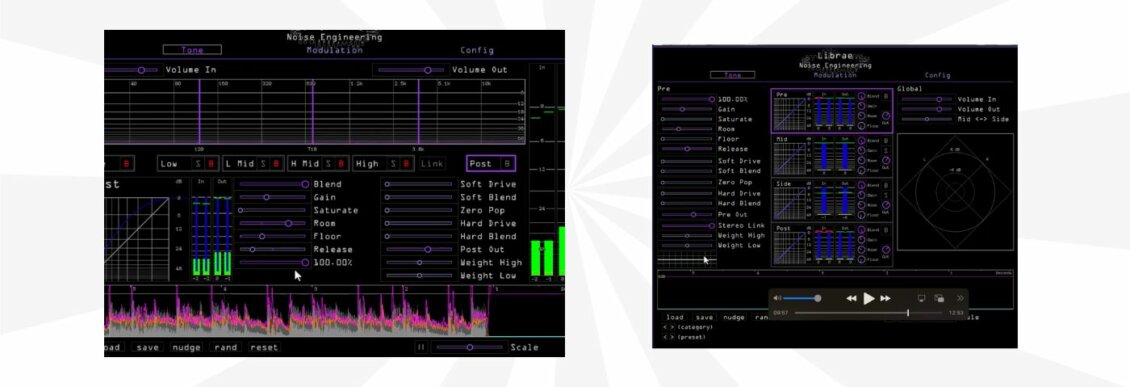CD, CD Çalar, DVD, DVD Çalar, SACD, LP, Plak Çeşitleri ve Fiyatları

Noise Engineering has recently released Librae and Polydactyl. Two easy-to-use, dynamic processors. We show you how to use them.
Noise Engineering is well known for its Eurorack modules. But the company also produces plugins. It’s quite rare for a Eurorack firm to offer both physical and digital products and Noise Engineering’s software is heavily inspired by their hardware.
In this tutorial video, we run through their two latest plugins, Librae & Polydactyl. What are they?
Librae
Librae is a very easy-to-use mid/side and stereo dynamics processor for compression, expansion, and limiting. It also features an extensive internal modulation matrix with LFOs, envelopes, and step sequencers.
Like its sister, Polydactyl, it comes with Noise Engineering’s highly distinctive GUI. But looks aside, it’s well priced, at $49, and powerful. And as you’d expect from a modular firm, the built-in modulation aspects help push this powerful dynamic processor into a lane its own. Librae flourishes when offering unique stereo-mixing effects and is perfect for experimenting with.
Polydactyl
Polydactyl is a powerful multiband dynamics processor plugin that precisely sculpts the dynamics of your audio tracks.
At first glance, the GUI should look familiar if you have used multiband compressors before. Similar to Librae, Polydactly excels with tone and modulation. Whilst the compression and dynamics are as you’d expect (high quality), the tone and modulation features take the plugin above and beyond.
Polydactyl is armed with a significant internal modulation matrix featuring LFOs, envelopes, and step sequencers. Lastly, modulators have adjustable randomization for easy humanization.
What we like about both is Noise Engineering has focused on their hardware strengths and applied them to their digital products. There are plenty of dynamic processors available so being able to cut through the noise requires something different.
What else? Free Plugins?
All accounts come with Freequel bundle which is three free plugins including Sinc Vereor, Virt Vereor, Ruina. In other words, sign up for free, get three free plugins and try Noise Engineering before committing. What’s not to like?
Watch the full walkthrough video and subscribe to Attack on YouTube.
[social-links heading=”Follow Attack Magazine” facebook=”https://www.facebook.com/attackmag” twitter=”https://twitter.com/attackmag1″ instagram=”https://www.instagram.com/attackmag/” youtube=”https://www.youtube.com/user/attackmag” soundcloud=”https://soundcloud.com/attackmag” tiktok=”https://www.tiktok.com/@attackmagazine”]
attackmagazine

Noise Engineering has recently released Librae and Polydactyl. Two easy-to-use, dynamic processors. We show you how to use them.
Noise Engineering is well known for its Eurorack modules. But the company also produces plugins. It’s quite rare for a Eurorack firm to offer both physical and digital products and Noise Engineering’s software is heavily inspired by their hardware.
In this tutorial video, we run through their two latest plugins, Librae & Polydactyl. What are they?
Librae
Librae is a very easy-to-use mid/side and stereo dynamics processor for compression, expansion, and limiting. It also features an extensive internal modulation matrix with LFOs, envelopes, and step sequencers.
Like its sister, Polydactyl, it comes with Noise Engineering’s highly distinctive GUI. But looks aside, it’s well priced, at $49, and powerful. And as you’d expect from a modular firm, the built-in modulation aspects help push this powerful dynamic processor into a lane its own. Librae flourishes when offering unique stereo-mixing effects and is perfect for experimenting with.
Polydactyl
Polydactyl is a powerful multiband dynamics processor plugin that precisely sculpts the dynamics of your audio tracks.
At first glance, the GUI should look familiar if you have used multiband compressors before. Similar to Librae, Polydactly excels with tone and modulation. Whilst the compression and dynamics are as you’d expect (high quality), the tone and modulation features take the plugin above and beyond.
Polydactyl is armed with a significant internal modulation matrix featuring LFOs, envelopes, and step sequencers. Lastly, modulators have adjustable randomization for easy humanization.
What we like about both is Noise Engineering has focused on their hardware strengths and applied them to their digital products. There are plenty of dynamic processors available so being able to cut through the noise requires something different.
What else? Free Plugins?
All accounts come with Freequel bundle which is three free plugins including Sinc Vereor, Virt Vereor, Ruina. In other words, sign up for free, get three free plugins and try Noise Engineering before committing. What’s not to like?
Watch the full walkthrough video and subscribe to Attack on YouTube.
[social-links heading=”Follow Attack Magazine” facebook=”https://www.facebook.com/attackmag” twitter=”https://twitter.com/attackmag1″ instagram=”https://www.instagram.com/attackmag/” youtube=”https://www.youtube.com/user/attackmag” soundcloud=”https://soundcloud.com/attackmag” tiktok=”https://www.tiktok.com/@attackmagazine”]